Structured Query Language or SQL is a standard query language for managing data stored in a relational database management system (RDBMS). Hence, it has become an essential skill for many careers in the IT industry, including in data science, software engineering, and web development.
If you want a lucrative tech career, you have to master SQL.
Fortunately, SQL is not too complicated to learn. You can excel in SQL effectively by taking online courses. They will help you gain knowledge and skills that will help you manage databases easily.
Nevertheless, you should not take any random online SQL courses since most are poorly created. Taking them can significantly delay your progress.
Instead, I recommend investing in only one or two high-quality courses. Upon completion, you will be ready to perform SQL-related tasks with confidence.
This article will thus feature only top SQL courses. You can select the one that suits your preference and budget to start learning immediately.
Affiliate Disclosure: This article from Victory Tale contains affiliate links. We will receive a small commission from course providers if you purchase a SQL course through them.
Nonetheless, we always value integrity and prioritize our audience’s interests. You can then rest assured that we will present each course truthfully.
Things You Should Know
Prerequisites
Unless indicated otherwise, most beginner-level SQL courses on this list have no prerequisites except basic computer skills. You can start learning without worrying about course requirements.
Criteria
Below are the criteria for the best SQL courses
- Credible instructors
- User-friendly learning platform
- The majority of course content is up-to-date.
- High-quality course materials
- Provide excellent value for money
- Mostly positive reviews from actual students
- My personal experience with the course, instructor, and learning platform (if any) must be positive.
SQL vs. MySQL, PostgreSQL, Oracle SQL…
All courses on this list will teach SQL or the language used for querying databases. However, each may use a different RDBMS (aka the database system).
The most popular RDBMS used in the courses are
- MySQL
- PostgreSQL
- Microsoft SQL
- Oracle SQL
In other words, you will learn the same language (SQL) in all courses, but the system you use in each course (MySQL, PostgreSQL, etc.) may be different.
Which one should beginners choose, then?
I think that is subjective. However, MySQL is the most common database (according to the 2021 Stackoverflow survey.) Thus, starting with MySQL may be a promising option.
1. Learn SQL Nanodegree Program
This Nanodegree program from Udacity is not very different from the beginner-level courses I discussed above. However, the pace will be faster as it assumes that you have basic knowledge of data types (string, integer, etc.)
This program is thus optimal for students who have a programming background since It will help them excel in SQL faster and provide opportunities to get valuable hands-on experience.
Note: This program uses PostgreSQL. If you want to learn other systems, you may want to consider other alternatives.
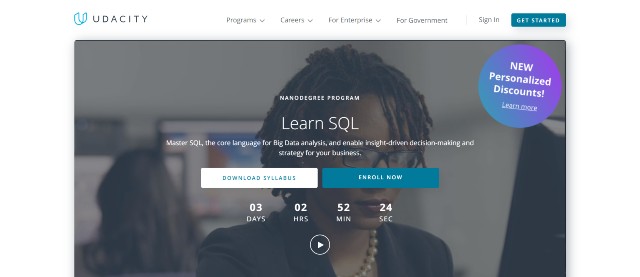
Course Content
This program comprises two minor courses as follows:
1. Introduction to SQL – The first course will introduce you to fundamental SQL concepts. You will learn how to execute essential SQL commands to perform various tasks, including joining & aggregating data and data tables.
The second part of the course will drill deeper into advanced tasks, such as using subqueries & window functions, cleaning data, optimizing SQL queries, and many more.
2. Management of Relational and Non-Relational Databases – The first part of this course will discuss methods to manage relational databases effectively. You will learn how to build normalized relational data models by using DDL to create schemas and migrating data utilizing DML.
The second part of this course will introduce you to non-relational databases such as MongoDB and Redis. You will understand the difference between both types of databases and handily select the right one for various real-world scenarios.
Both courses in the program are equipped with excellent learning resources. Each has numerous quizzes, exercises, assignments, and real-world projects for students to complete.
Udacity’s projects are insightful and challenging. In the first course, you will use SQL to help analyze data and generate actionable insights to raise awareness about global deforestation and build database structures to support a social media news aggregator in the second.
Hence, upon program completion, you will have sufficient project-building skills to showcase to recruiters and prospective clients proudly.
Udacity suggests spending 10 hours per week on the program, which can be too intense for some students.
However, this is hardly an issue as the program is entirely self-paced. Feel free to adjust the study time. Just keep in mind that the more time you spend on the program, the higher the tuition fees (see #pricing below)
Student Support
Student support is one of the main reasons that makes Udacity shine. Enrolling in a program will provide access to the three following types of support.
1. Technical Mentor Support – Udacity mentors are always available to support students 24/7. You can request assistance via the chat interface on Student Hub and receive a reply in less than an hour.
Such timely support is particularly beneficial because you do not need to wait forever for assistance on forums like other online courses. Your learning pace will be smoother, saving hours of your valuable time in the process.
Note: Unlike edX’s coaching, you can ask mentors technical questions, and this type of student support is available to all students worldwide.
2. Project Reviews – You can make unlimited requests for experts to review your work. Within a few hours, you will receive personalized feedback along with additional practical tips that will enhance your skills.
Udacity does not have limits on submissions. Thus, you can receive unlimited feedback on your projects, creating a feedback loop that assists your learning.
3. Career Services – Like web development bootcamps, Udacity’s team will review your resume, LinkedIn profile, and Github portfolio to ensure that they properly showcase your skills and potential, increasing the chance of receiving interview invitations from tech giants.
Pricing
This program costs $399 monthly, but if you pay for two months at once, you will receive a 15% discount, lowering course fees to $339 per month.
Fortunately, Udacity frequently offers discounts and financial support on all of its programs. Some of which can be as high as 75% off. Thus, you can enroll in this excellent program by paying $100 or even less per month.
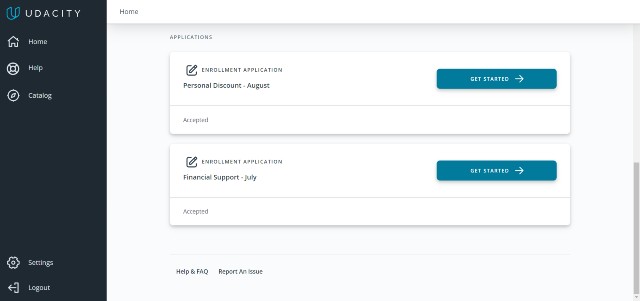
Suppose you are still unsure whether this SQL program is right for you. I recommend downloading the course syllabus to learn more about the course content and platform features that assist your learning.
[sc name=”udacity” ][/sc]Pros & Cons
Pros
- Unarguably one of the best online SQL courses
- Learn from industry experts with years of experience working in IT
- Well-structured curriculum
- In-depth lessons with simplified explanations
- Challenging quizzes, assignments, and real-world projects
- Udacity frequently updates its lessons. Hence, outdated content is rare.
- Timely mentor support + Unlimited project reviews
- Career services are a big plus.
Cons
- Expensive compared to other alternatives
2. Introduction to Databases
Not Available in 2023
If you are looking for a comprehensive SQL course, this edX program created by New York University (NYU) is one of the best available. You start with the basics and progress to advanced database administration in one go.
Note: This program utilizes MySQL, one of the most beginner-friendly relational database management systems. However, if you want to learn about other systems, please consider other courses on this list instead.
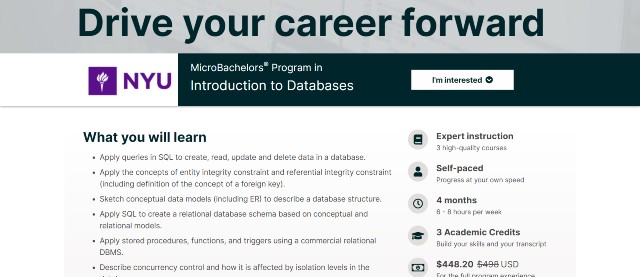
Course Content
This program consists of three minor courses as follows:
1. Introduction to Database Queries – The first course will introduce you to fundamental database concepts, organizations, and models.
You will also learn about DML or Data Manipulation Language (a subset of SQL) and how to issue queries and develop them to perform CRUD operations (Create, Read, Update, Delete) to data stored in a database.
2. Advanced Database Queries – The second course will explore interaction with relational database management systems. You will develop advanced queries in SQL that aggregate data and utilize subqueries and built-in functions.
At the end of the course, you will design an efficient database for storing data and returning accurate results.
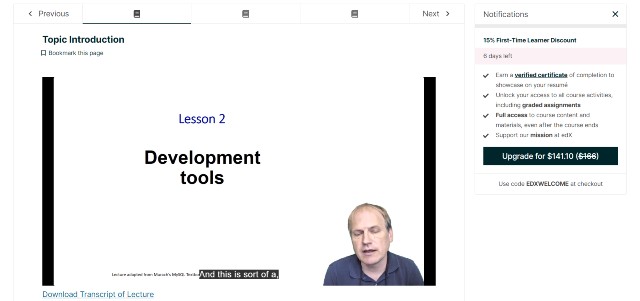
3. Advanced Database Administration – This final course will equip you with the required skills to manage RDBMS efficiently.
First, you will learn about DDL (Data Definition Language, another subset of SQL), its syntaxes, and real-world usages. Later on, the course will discuss how to manage concurrency control and create objects in a database.
Apart from the lessons, this program has complete assignments to test and strengthen your skills, like an on-site university course. If you score a 70% grade on average, you will receive three academic credits from Thomas Edison University (albeit not NYU).
Regarding the learning pace, NYU recommends spending 6-8 hours weekly, and you will complete the entire program in 4 months. I think the pace is perfectly manageable for those with full-time employment.
if you reside in the US, you can also access edX coaching services through SMS, email, and in-app messages. Your coach will assist you on career-oriented topics (resume, cover letter, interview) and help you stay motivated.
Full access to this program, known as the verified track, costs $448 one-time. Alternatively, you can audit each course for free. However, you will not be able to access grading, coaching, and a digital certificate.
I recommend auditing the first course beforehand. If you are satisfied, you can purchase the verified track later.
Pros & Cons
Pros
- Learn from a faculty member of a renowned university
- Well-structured, comprehensive curriculum
- Informative lessons
- Excellent student assessment
- Self-paced learning
- Coaching access (available only to students living in the US)
- Obtain three academic credits upon program completion (only if you pass the program with a 70% grade or higher)
- Free auditing
Cons
- Costlier than most alternatives
3. Stanford’s Database Series
Stanford University has created a series of five SQL and database courses on the edX platform. The series mainly covers the same content as an NYU program but focuses more on the database structure, background process, and other theoretical aspects.
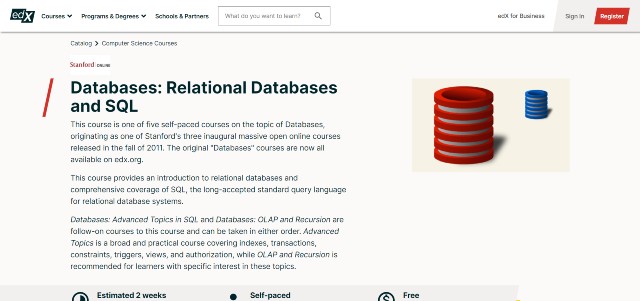
Course Content
This series does not have bundle pricing. You will need to buy each course separately.
1. Relational Databases and SQL – The first course will introduce you to relational databases and their systems. You will also learn fundamental SQL concepts.
2. Advanced Topics in SQL – The second course will continue from what the first has left off. You will learn to create objects to increase query performance and use transactions for concurrency control and failure recovery.
The second part of the course will discuss database constraints, triggers, views, and authorization in detail.
3. OLAP and Recursion – This course will drill deep into online analytical processing (OLAP) features, including star schemas, the data cube concept, and the Cube and Rollup operators.
Subsequently, you will learn about SQL standards for queries over recursive relations.
4. Modeling and Theory – The fourth course is entirely dedicated to explaining theories. You will learn about Relational Algebra, dependency theory, and the Unified Modeling Language (UML).
5. Semistructured Data – The final course will discuss JSON and XML standards for semistructured data. In the second part, you will learn about the XPath Language for processing XML data and its relevant features.
Each course has exercises and assignments that you can work on to understand the concepts better.
Stanford recommends spending 8-10 weeks on each course, and you will complete the series in ten weeks. The suggested pace is quite intense. However, the series is self-paced. You can set your learning schedule independently.
You can audit each course for free, while a verified track costs $50 (or $250 or all five courses.)
Pros & Cons
Pros
- Excellent, theoretical-based curriculum
- Learn from a professor of a renowned university
- Well-structured curriculum
- Detailed lecture notes provided
- Self-paced learning
- Free auditing
Cons
- Not the best option if you want to gather hands-on experience
4. Complete SQL and Databases Bootcamp: Zero to Mastery [2023]
This ambitious Udemy course aims to be a one-stop shop. It covers SQL fundamentals, database management, and database design and explains how to work with various RDBMS, including MySQL and PostgreSQL.
You will learn with Andrei Neagoie and Mo Binni. Both are experienced software developers with years of experience.
I have taken several courses with Andrei and appreciate this teaching style. Thus, I decided to recommend him to you.
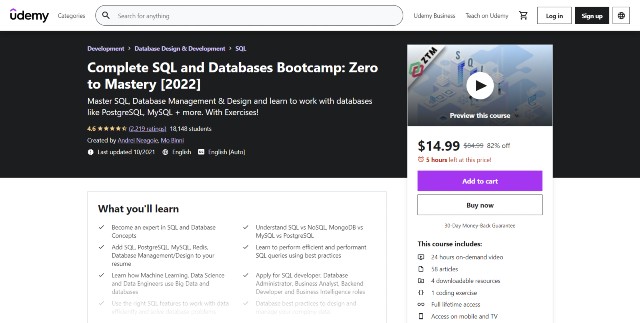
Course Content
Below is a summary of what you will learn from the course.
- Introduction to Databases and SQL
- Environment set up
- SQL Fundamentals (Writing SQL queries, Functions, Operators, Joins, etc.)
- Advanced SQL (GroupBy, Views, Indexes, Subqueries, etc.)
- Deep dive into database management
- Database design
- Performance & Security
- Data Engineering, Machine Learning, Redis
- Databases for web applications (Node.js)
In total, this course has more than 24 hours of video content. Andrei will use a hands-on approach in his teaching. He will guide you from basic SQL syntax to writing complex SQL queries and scaling databases. You will learn some theories, but the focus is much more on the practicals.
Furthermore, this course also has abundant quizzes, exercises, and projects that you can work on to test your knowledge and strengthen your SQL skills.
Reviews: 4.6/5.0, Students: 18000+
Pros & Cons
Pros
- Beginner-friendly
- Cover all essential modern toolchains used by data scientists and software developers
- Learn about MySQL and PostgreSQL features
- Project-based lessons with clear explanations
- Hands-on approach
- Lifetime Access + 30-day money-back guarantee
- Inexpensive ($20 or lower when on sale)
Cons
- All assignments should be more challenging.
- Several students believe the pace is painfully slow. Hence, if you have learned some programming, I think you may want to consider other courses instead.
5. Datacamp’s SQL Series
Suppose you are not fond of learning through videos. In this case, Datacamp, which utilizes interactive learning to teach data science, might be your best choice. You will learn by following text-based instructions and starting coding right away on the platform.
I think Datacamp’s courses are more entertaining than average video courses. Therefore, I can concentrate longer on the course content and complete it faster.
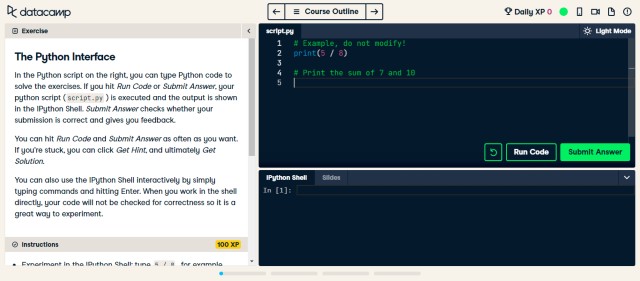
Course Content
Datacamp has as many as 38 SQL courses on its platform, which are too numerous for me to feature them all. Below is a summary of key topics you learn in the series.
- Introduction to SQL, SQL Server, and Relational Databases – You will learn to query tables in MySQL database, perform data manipulation tasks, and understand steps to create relational databases
- Joining Data – You will join multiple tables and work with subqueries.
- Intermediate SQL – This course will explain how to write complex SQL queries and prepare data sets for analysis in PostgreSQL
- Data Manipulation – You will use PostgreSQL functions to manipulate, process, and transform data.
- Data cleaning – This section will drill deep into the steps professionals must take before using the data. You will learn to reorganize messy data in the databases.
- Data Analytics – You will learn how to perform data analysis using SQL. You will write complex queries to analyze business data and perceive how you should approach date and time data.
- Query Performance – You will learn to write straightforward queries that are easier to read and run many times faster.
- Oracle SQL – This section will introduce you to Oracle SQL and learn how to import and manipulate data with it.
- NoSQL – This section is more like optional content. You will learn about innovative NoSQL databases and popular engines.
There are 50-100 hours worth of SQL content on the platform. All the courses are already in groups. Hence, it is effortless to complete them in order.
In addition to interactive lessons, you can practice further by completing more than 80 real-world projects. You will use SQL with other tools to manipulate and analyze data, solidifying your knowledge and strengthening your data science skills in a process.
With Datacamp, you will have a better cumulative learning experience and understand essential concepts faster than learning through video courses. Overall, Datacamp is an excellent data science learning platform for absolute beginners.
Nevertheless, Datacamp has one significant drawback. It is not a one-stop-shop for learning SQL, databases, and data science in general.
Once you reach the intermediate level, you will start to think that the lessons are too simplified and the exercises are not challenging at all.
Ultimately, if you are determined to pursue a data science or software development career, Datacamp’s courses will not be sufficient. You still need to buy additional advanced courses to learn more about complex concepts and real-world applications.
Pricing
Currently, Datacamp offers two paid plans as follows (all rates below are for annual plans).
- Premium – starting at $12.42 per month
- Teams – $25 per month
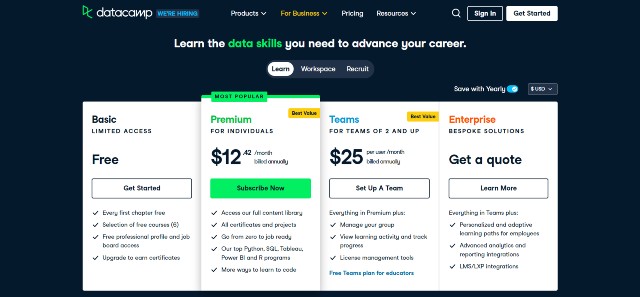
The Premium plan provides access to all content on the platform (335+ in total). Thus, you can take SQL courses along with those on Python, R, Scala, data analytics, Power BI, Tableau and many others.
Note: Datacamp offers a 75% discount on the Premium plan once every quarter (the time is pretty random, though). Thus, you can subscribe to the Premium plan by paying as low as $5 per month.
Pros & Cons
Pros
- Beginner-friendly, best for absolute beginners
- Utilize the Interactive learning approach
- Entertaining, bite-sized lessons, which are highly suitable for absolute beginners
- Browser-based: You don’t need to install any software on your computer, as you will code and perform all the tasks on the browser.
- Cover several leading RDBMS, including MySQL, PostgreSQL, Oracle SQL, and Microsoft SQL
- Learn anywhere, anytime through an excellent mobile app
- The subscription provides all-in-one access. You can then learn other data science courses without paying extra course fees.
Cons
- Courses are not in-depth enough once you reach the intermediate level.
6. The Ultimate MySQL Bootcamp: Go from SQL Beginner to Expert
This top-rated Udemy course will explain SQL (the language) concepts and how to use MySQL (the database management system) in detail. You will create databases, interact with them, and use them in several tasks, including building a web application and creating insightful reports.
You will learn from Colt Steele and Ian Schoonover. Both have years of experience teaching students at two bootcamps under their belt.
I have also taken another course from Colt before and found that he is highly knowledgeable and has exceptional teaching skills. Hence, I am confident that you will have an excellent experience learning from him.
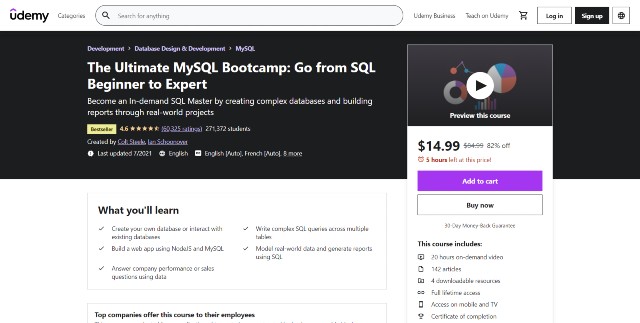
Course Content
The following is a summary of all course content.
- Installation of all the required software + Relational Database Concepts
- Create databases and tables + Insert data
- CRUD Operations
- String Functions
- Refining Selections + Aggregate Functions
- Logical Operators
- Build a web application using MySQL and Node.js
- Generate insightful reports by analyzing real-world data using MySQL
This course is 20-hour long. Besides learning essential SQL concepts and completing quizzes, you will work on several mid-sized real-world projects. However, you are not on your own, as both instructors will guide you through the entire process and provide practical tips, tricks, and best practices.
The drawback of this course is that it does not cover advanced concepts and applications. You will need another online SQL course on those topics or enroll in the NYU program (#1) instead.
Reviews: 4.6/5.0, Students: 270,000+
Pros & Cons
Pros
- One of the best MySQL courses for beginners
- Learn from highly knowledgeable instructors who have experience teaching students at prestigious programming bootcamps
- Well-structured curriculum
- Bite-sized lessons with clear explanations and top-notch examples
- Include several real-world projects that will help you gain valuable hands-on experience
- Lifetime Access + 30-day money-back guarantee
- Inexpensive ($20 or lower when on sale)
Cons
- Does not cover advanced concepts and applications
- As of October 2021, several reviewers noted that the course does not cover minor concepts such as UNION and secondary keys.
7. SQL – MySQL for Data Analytics and Business Intelligence
If you are into data analytics and business intelligence, this concise course from 365 Careers will equip you with all the required knowledge and skillsets for performing tasks in those two fields.
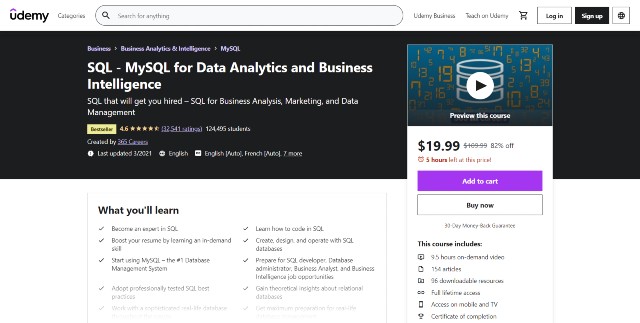
Course Content
What you will learn from the course is as follows.
- Introduction to databases, SQL language, and MySQL
- SQL theory and database terminology
- Create a database + Introduction to data types and tables
- Constraints and best practices
- SELECT, INSERT, UPDATE, DELETE statements
- Aggregrate Functions
- Joins, Self Join, Subqueries, Views
- Variables, Triggers, Indexes
- Use SQL with Tableau
The course length is 9.5 hours long since it only focuses on the core SQL concepts. All explanations are direct to the point, allowing students to proceed faster. Once you complete all the lectures, you can also work on various assignments, such as quizzes and downloadable exercises.
I think this course is suitable only for future business analysts or financial analysts looking for a crash course to grasp critical concepts time-efficiently or refresh their knowledge.
However, if you want to get into software development or database administration, this course will not suffice.
Reviews: 4.6/5.0, Students: 124000+
Pros & Cons
Pros
- Excellent crash course for SQL
- Concise but informative explanations
- Well-structured curriculum
- Learn how to use SQL with Tableau
- Lifetime Access + 30-day money-back guarantee
- Inexpensive ($20 or lower when on sale)
Cons
- Does not cover advanced concepts and applications
- Several students complained that the narration/voiceover is monotone and boring.
8. SQL and PostgreSQL: The Complete Developer’s Guide
This Udemy from Steven Grider will drill deep into SQL (the language) and PostgreSQL (RDBMS). You will create, design, and manage effective database structures.
Steven is an experienced software developer who has been mentoring new hires for tech companies for many years. Hence, you can rest assured that the quality of the training you will receive is top-notch.
Having taken some courses with him, I found Stephen a passionate instructor with a unique teaching approach. Steven usually discusses all potential methods to attain the objectives, including those that will not work.
He will then explain in detail why some particular methods work and others do not. Such an approach is highly beneficial for learning programming.
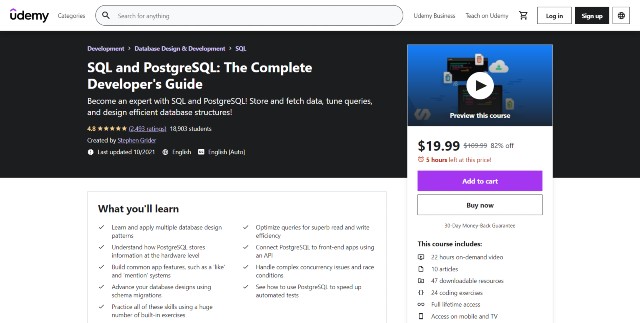
Course Content
The entire curriculum is 22-hour long. Below is a summary of what you will learn from the course.
- SQL Statements (Create tables, Insert/Retrieve data, String Operators & Functions, etc.)
- Filtering Records
- Working with Tables + Relating records with Joins
- Records aggregation, Sorting Records, Unions
- Deep dive into subqueries
- PostgreSQL complex data types
- Design Patterns
- Background process of PostgreSQL
- Query Tuning
- Indexes and Views
- Concurrency control
- Schema Migrations
- and many more
Overall, the course content heavily explains PostgreSQL concepts, processes, and best practices. Once you complete the program, you will comfortably manage your own databases.
Though the course looks promising, it is not without drawbacks. First, Stephen does not provide massive, real-world projects for students to complete. You will need another course if you want to.
Second, and most importantly, Stephen will use Node.js in the last section. Hence, it is tough for those unfamiliar with this JavaScript runtime environment to understand the content thoroughly.
Because of this issue, I think this course will work best for web developers who already have some experience in backend development. Absolute beginners can undoubtedly take the course but will not utilize all course materials to their full potential.
Reviews: 4.8/5.0, Students: 18800+
Pros & Cons
Pros
- Learn from a highly knowledgeable instructor with a unique teaching approach
- Comprehensive and well-structured curriculum
- Informative lessons with clear explanations
- Perceive how PostgreSQL works behind the scenes
- Numerous exercises and quizzes to strengthen your understanding
- Lifetime Access + 30-day money-back guarantee
- Inexpensive ($20 or lower when on sale)
Cons
- No large, real-world projects for students to complete
- In the last part of the course, you will use Node.js. Students who don’t have a Node.js background mostly struggle to understand the content.
9. PostgreSQL Bootcamp: Go From Beginner to Advanced, 60+hours
With 67.5 hours of video content, this course unarguably provides the most in-depth training on PostgreSQL.
Adnan Waheed, who has decades of experience in business analytics, will guide you from basic to advanced concepts in the most comprehensive manner possible.
Thus, if Stephen’s course does not include topics you want to master, you may want to try this course instead.
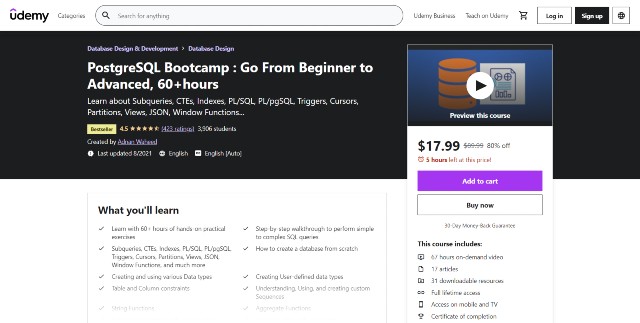
Course Content
Below is a summary of what you will learn from the course.
- Introduction to PostgreSQL (Installation + Create/Modify Tables)
- Modify/Query/Filter Data
- Data Types
- Constraints, Functions, Sequences
- Join multiple tables + Combine queries
- PostgreSQL Schemas
- Array Functions
- JSON with PostgreSQL
- Indexes and Performance Optimization
- Views, Subqueries, and Common Table Expressions (CTE)
- Window Functions
- Table Partitions, Cursors, Transactions
- PostgreSQL Internals
- and many more
In essence, you will learn everything you need to know to complete any PostgreSQL project. Adnan will explain every concept in detail and guide you through the entire process of managing PostgreSQL databases.
The only drawback is that Adnan can be extremely fast in his teaching pace. Some enrolled students need to decrease the play speed or even pause the video.
Reviews: 4.5/5.0 Students: 3,900+
Pros & Cons
Pros
- Well-structured, all-in-one curriculum covering all aspects of PostgreSQL
- In-depth and informative lessons
- Clear explanations with examples on almost every topic
- Students will be able to work with various types of real-world data (stock market, human resources, eCommerce, etc.)
- Lifetime Access + 30-day money-back guarantee
- Inexpensive ($20 or lower when on sale)
Cons
- Several students noted that the instructor could be extremely fast in explaining the concepts. This may be beneficial for fast learners, though.
- The instructor’s voice is monotone in some lessons.
10. Complete Microsoft SQL Server Database Administration Course
This Udemy course from Imran Afzal and Abbas Mehmood aims to train students to become professional Microsoft SQL database administrators and prepare them for MCSA and MTA certification exams.
Both Imran and Abbas are engineers with more than 20 years of experience in system and database administration. Learning from such well-versed instructors rarely disappoints.
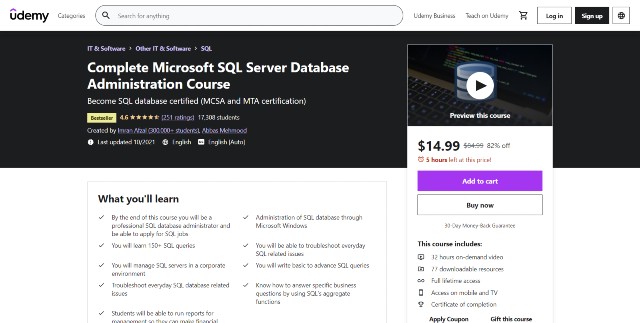
Course Content
This video course is 32 hours long. What you will learn from the course is as follows:
- Introduction to SQL and RDBMS + Install SQL Server
- Fundamentals of databases and SQL commands (DML, DDL, DCL, TCL)
- Query and manipulate data using SQL + Write basic SQL statements
- Microsoft SQL Database Administration and System Databases
- How Microsoft SQL works
- Deep dive into Microsoft SQL Backup/Restore, User Agent Management, and Server Agent Management
- Advanced topics (High Availability, Replication, Encryption, etc.)
The curriculum will mostly cover all the crucial topics you need to know to become a database administrator. Upon course completion, you will be comfortable managing enterprise-level SQL servers, troubleshooting issues, and creating reports for executives.
Several students reported minor issues regarding course materials, such as grammatical mistakes and low-resolution videos. These are hardly an issue, but they can still distract some learners.
Reviews: 4.6/5.0 Students: 17300+
Pros & Cons
Pros
- One of the very few high-quality Microsoft SQL courses available
- Learn from two highly knowledgeable instructors
- Easy-to-follow curriculum
- Informative lessons with detailed explanations
- Lifetime Access + 30-day money-back guarantee
- Inexpensive ($20 or lower when on sale)
Cons
- Course materials seem to have several minor issues, such as grammatical mistakes or low-resolution videos (720p), which can fail to satisfy some learners.
- Some students believe the instructors should add more examples.
11. The Complete Oracle SQL Certification Course
This Udemy course from Imtiaz Ahmad functions like test prep. It assists test-takers in preparing for an Oracle SQL certification exam (Exam 170-071).
However, it also provides excellent general training for Oracle SQL and has no prerequisites. Thus, absolute beginners who want to learn Oracle SQL can take this course and possibly pass the certification exam.
Imtiaz is a developer who has built enterprise financial software for several prestigious financial institutions on Wall Street, including Goldman Sachs. I am confident that your SQL skills will improve significantly once you complete the course.
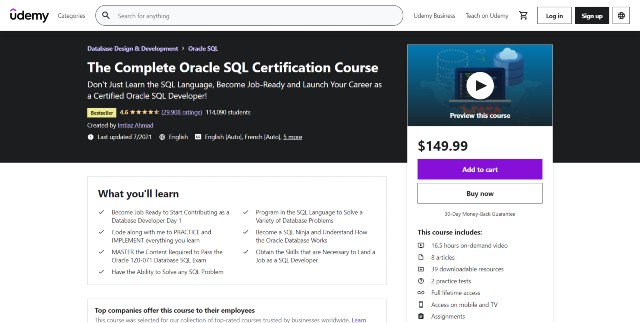
Course Content
Following are the key topics that you will learn in this Oracle SQL course.
- Database Basics + Oracle Workspace
- Single Table Queries
- Single Row Functions
- Grouping Functions
- Analytical Functions
- Multi-table queries and Joins
- Create, alter, and update projects using SQL
- Review for Exam 1Z0-071 (Oracle Database SQL Exam)
Since this course is more like test prep, it will focus on the content that can appear in the exam. Thus, it may not be as comprehensive as other courses.
However, you can still learn a lot from the course since it comprises all knowledge and skills that Oracle SQL developers use most in their careers.
This course does not include projects, but you can still work on quizzes and exercises to sharpen your knowledge. Furthermore, Imtiaz provides two practice tests with solutions in the course materials that you can use in exam preparation.
Reviews: 4.6/5.0, Students: 114000+
Pros & Cons
Pros
- Learn from a knowledgeable instructor who has exceptional teaching skills and a passionate attitude
- Clear and step-by-step explanations with good examples
- Students can use this course as a test prep for the Oracle Database SQL Exam (Exam 1z0-071)
- Lifetime Access + 30-day money-back guarantee
- Inexpensive ($20 or lower when on sale)
Cons
- Not comprehensive: Some minor concepts are missing.
- Video lessons are not bite-sized. Some could be as long as 20-30 minutes.
12. The Ultimate Oracle SQL Course: SQL Made Practical
If you want to get into Oracle SQL and become job-ready quickly, this course from Carlos and his Standout-Dev Academy is worth your consideration.
Carlos is an enterprise software developer working with Oracle databases daily for almost two decades. Hence, he has the mastery that can help you learn Oracle SQL fast and effectively.
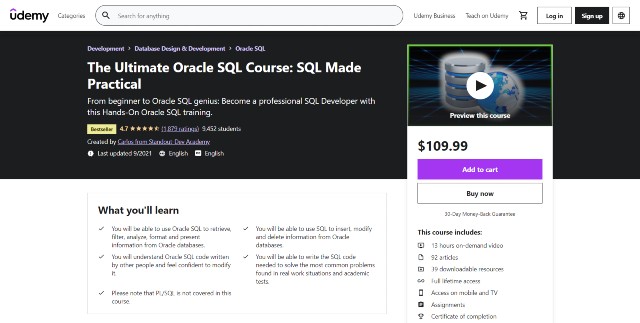
Course Content
The length of this video course is 13 hours. You will learn the following topics in detail:
- Introduction to Databases and RDBMS + Installations
- SELECT Statement
- Filter and sort results
- Operators & Group Operations
- Subqueries
- Single Row Functions
- Analytic Functions
- Set Operators and Hierarchical queries
- DDL and DCL in SQL
- and many more
Unlike most Oracle SQL training that focuses on the theoretical, this one emphasizes writing actual code. In other words, you will learn all the steps that Oracle SQL developers have to perform when they manage databases in real life.
All the lessons are bite-sized (6 minutes long or less). Furthermore, the curriculum comprises numerous assignments and quizzes (one every 3-4 lessons). Each of them is adequately challenging, effectively assisting your skill progression.
Reviews: 4.7/5.0, Students: 9,400+
Pros & Cons
Pros
- Learn from an experienced Oracle SQL developer with almost two decades of experience.
- Beginner-friendly
- Well-structured curriculum
- Bite-sized lessons with clear explanations and practical examples
- Numerous challenging quizzes and assignments
- Lifetime Access + 30-day money-back guarantee
- Inexpensive ($20 or lower when on sale)
Cons
- The instructor can be repetitive at times.
13. Modern Big Data Analysis with SQL Specialization
This Coursera specialization from Cloudera offers different perspectives compared to other courses. You will learn the same SQL but use it to analyze big data, not just smaller-scale data.
Since this skill is highly in demand and lucrative, I recommend taking this course apart from the SQL course of your choice.
In addition, students who plan to take the Cloudera Certified Associate (CCA) Data Analyst certification exam can use this specialization as their test prep.
Important Note: This program has hardware requirements. Please make sure your current hardware satisfies them before enrolling.
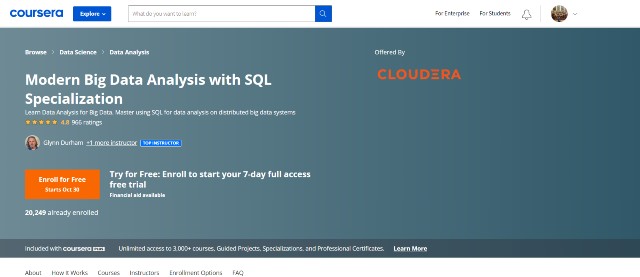
Course Content
This specialization consists of three courses as follows:
1. Foundations of Big Data Analysis with SQL – The first course will introduce you to the SQL language, databases, and big data. Subsequently, you will learn about SQL tools that you will use to work on big data platforms.
Finally, you will be able to explore databases and tables in a big-data environment.
2. Analyzing Big Data with SQL – In the second course, you will use different tools to navigate databases, learn steps to analyze big data, and answer analytic questions.
You will use two big data engines: Apache Hive and Apache Impala.
3. Managing Big Data in Clusters and Cloud Storage – The third course will mainly discuss strategies to manage big datasets.
You will learn how to load them into clusters and cloud storage. Then, you will apply structure to those datasets, allowing you to use distributed SQL engines to run queries on them.
As of October 2021, this specialization is under development. Cloudera still has not released the fourth and final course of the program, which will cover advanced SQL for big data analysis. If you want a complete learning experience, you need to wait for the release.
Cloudera recommends spending 3 hours per week on the program; you will finish it in 4 months. The pace is thus perfectly manageable.
Full access to the program costs $49 per month. Alternatively, you can audit each course for free, but your assignments will not be graded, and you will not receive a certificate.
Pros & Cons
Pros
- One of the very few courses that teaches big data analysis with SQL
- Learn from senior instructors from Cloudera, a leading enterprise data cloud provider
- Well-structured curriculum
- Engaging, informative lessons with excellent presentations
- Students can use the program as test prep for the certification exam
- Free auditing
Cons
- The program is still incomplete.
- Many students agree that the third course is too focused on reading materials. There are a few video lessons, but they are certainly not sufficient.
Other Alternatives
Below are other SQL courses that you may want to consider as well. However, some have issues or are simply not worth the investment at this point. Thus, I decided to leave them right here for now.
PostgreSQL for Everybody Specialization – I switched back and forth on my recommendations regarding this program from UMich. The program is well-structured, and you will learn PostgreSQL from a leading professor, which is excellent.
However, the program seems to be fragmented or incomplete in some parts. Also, the content is not very in-depth compared to those on the list. Hence, I think the cons outweigh the pros, so I chose not to recommend this program for now.
Still, since this is a Coursera program, you can audit the course for free if you want.
The Complete Oracle SQL Bootcamp (2023) – This online course on Udemy from Oracle Master training offers one of the most in-depth training for Oracle SQL.
The instructor will demystify the theoretical part by drilling deep into the details, allowing you to understand the concepts by heart and use Oracle SQL professionally.
Among all courses featured in this article, I think the curriculum of this course is the most well-structured. There are no giant leaps in difficulty or unrelated topics jumping out of nowhere.
Besides completing the video lessons, you can work on quizzes to test your skills. If you plan to take the exam, you can work on three newly-added exam samples at the end of the course (more than 200 questions in total).
The only reason that I did not include this course on the list is that I cannot understand him clearly. The instructor has a strong accent, and his voice is somewhat muffled. Student reviews indicate that many face this issue as well.
You can try taking some of the free lessons from the course page. If you have no problem understanding him, this course may be the best Oracle SQL course and definitely worth purchasing.
Dataquest – Having utilized interactive learning like Datacamp, Dataquest offers several SQL online courses on its platform. However, their content is even more limited than Datacamp. I don’t think it is worth the price ($24.50 per month) at this point.
Codecademy – Codecademy is another online programming school that utilizes interactive learning. Currently, Codecademy offers several SQL courses, ranging from SQL fundamentals to data analysis with SQL.
However, its SQL content is not as in-depth as Datacamp. I think it is not the best option to learn SQL online.
Related Courses
Once you have already mastered SQL, you may find this list of courses helpful if you want to upskill even further.
Python Programming – Python is the language of data science and machine learning. It is the prerequisite for every intermediate/advanced course in the field.
R Programming – An excellent alternative to Python
Data Engineering – Data engineering is one of the most lucrative careers in the 21st century. Mastering this skill would enhance your career options significantly.
Machine Learning – An excellent choice if you want to kickstart your journey in the growing industry. Machine learning is a prerequisite for deep learning, reinforcement learning, or natural language processing. All of these have stellar career prospects.